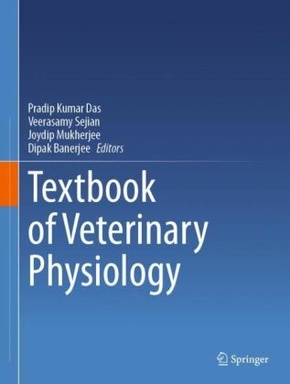
Textbook of Veterinary Physiology
| Verlag | Springer |
| Auflage | 2023 |
| Seiten | 803 |
| Format | 27,9 cm |
| Gewicht | 2242 g |
| Artikeltyp | Englisches Buch |
| EAN | 9789811994098 |
| Bestell-Nr | 81199409DA |
This textbook explores the fundamental qualitative and quantitative aspects of veterinary physiology. It presents the morphological description of the organs, tissues, and cells involved in the physiological system with species variation. The book provide the most up-to-date information and in depth knowledge in animal physiology. The book addresses a broad range of topics, including the physiology of digestion in, monogastric animals, ruminants, and birds, and cardio vascular and respiratory system in different animals. The chapters contain a wealth of information on the areas related to the endocrine system, excretory system, body fluid homeostasis, hematology, male and female reproductive systems, coordination of body functions, and regulation of brain functions and sense organs. Further, this book acquaints students with advanced topics like immune system, assisted reproductive technology, ovarian dynamics, environmental physiology and thermoregulation, and behavioral phys iology. This textbook contains clear illustrations including graphical abstracts and study questions for each chaptermaking this book a valuable learning resource for veterinary sciences and veterinary medicine students.Further to attract students and create interest in them, interesting facts related to animal physiology have also been highlighted in form of "Know more widges".
Inhaltsverzeichnis:
Section 1: Introduction.- Chapter 1.1. Veterinary physiology - past, present and future perspective.- Chapter 1.2. Cellular and molecular physiology.- Chapter 1.3. Action potential.- Section 2: Hematology and Immune System.- Chapter 2.1. Hematology.- Chapter 2.2. Immune system.- Section 3: Cardiovascular, Respiratory and Excretory System.- Chapter 3.1. Cardiovascular system.- Chapter 3.2. Physiology of respiration.- Chapter 3.3. Fluid and electrolyte balance.- Chapter 3.4. Excretory physiology.- Section 4: Neuro-muscular System and Special Senses.- Chapter 4.1. Muscular system.- Chapter 4.2. Nervous system.- Chapter 4.3. Special senses.- Section 5: Digestive System.- Chapter 5.1. Physiology of digestion.- Chapter 5.2. Ruminant digestion.- Section 6: Endocrine System.- Chapter 6.1. General endocrinology and hormones of hypothalamus and pituitary.- Chapter 6.2. Hormonal regulation of metabolism, water, and minerals.- Chapter 6.3. Hormones of gonads and non-classical endocrine organ s.- Section 7: Reproductive System.- Chapter 7.1. Development of sex organs.- Chapter 7.2. Functional morphology of the male reproductive system.- Chapter 7.3. Spermatogenesis and Semen.- Chapter 7.4. Functional morphology of the female reproductive system.- Chapter 7.5. Female reproductive physiology.- Chapter 7.6. Fertilisation, gestation and parturition.- Chapter 7.7. Assisted reproductive technologies in farm animals.- Section 8: Lactation Physiology.- Chapter 8. Lactation physiology.- Section 9: Physiology of Growth and Behaviour.- Chapter 9.1. Physiology of growth.- Chapter 9.2. Physiology of animal behaviour.- Section 10: Environment and Thermoregulation.- Chapter 10.1. Environmental physiology and thermoregulation in farm animals.- Chapter 10.2. Thermoregulation in birds.
